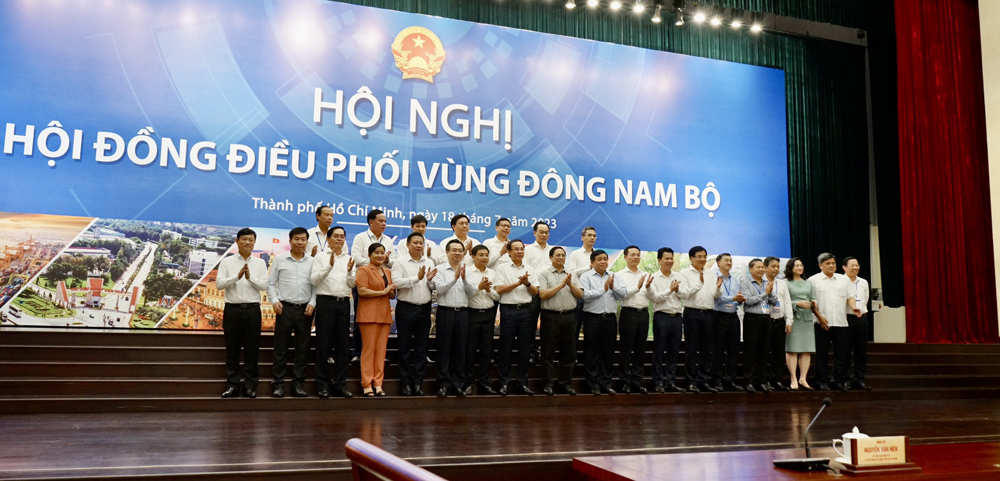Building up a dynamic and sustainable Southeastern region
Early July 18, Prime Minister Pham Minh Chinh chaired a conference of the Coordinating Council of the Southeastern Region in Ho Chi Minh city. The event was attended by Nguyen Van Nen, Politburo member, Secretary of Ho Chi Minh city’s Party Committee, leaders of ministries, sectors, localities in the Southeastern region. Leaders of Binh Duong province, including Nguyen Hoang Thao, Permanent Vice-Secretary of provincial Party Committee, Vo Van Minh, Vice- Secretary of provincial Party Committee, Chairman of provincial People's Committee and leaders of a number of provincial departments and sectors attended the event.
Upholding regional coordinating role
The conference announced the Prime Minister’s decision on establishing the Coordinating Council of the Southeastern Region. The Regional Coordinating Council was established to renew the region’s coordination mechanism, promote the region's rapid and sustainable socio-economic development, protect the environment, ensure national defense and security. The Regional Coordinating Council will focus on the tasks of formulating and organizing the implementation of the master plan; making investment in development, formulation of mechanisms and policies, settlement of regional linkage problems; regional coordination plan and regional database, highlighting the personal responsibility of the head for the council's work...
.jpg) Prime Minister Pham Minh Chinh talks to leader of Binh Duong province on the sideline of the conference
Prime Minister Pham Minh Chinh talks to leader of Binh Duong province on the sideline of the conference
The set goal is to develop the Southeastern Region into a dynamic development region with high economic growth, the largest growth engine in the country; a science - technology and innovation center, a high-tech industrial, logistics and international financial center with high competitiveness in the region. The region will take the lead in improving growth models, making digital transformation, building digital government, digital economy, digital society, rapidly developing a smart and modern urban system; basically complete a trafffic system with inter-regional, regional connectivity; become a trade hub with international integration.
The fields of culture, society, education - training, and health in the Southeastern region have taken the lead nationwide. The material and spiritual lives of the local people has been improved markedly and taken the lead nationwide. The province’s environmental pollution, traffic congestion and flooding have been basically solved, with national defense, political security, social order and safety maintained.
The conference said ok with regional planning that is very important. The planning process must ensure planning and development requirements in the whole region towards the goal of sustainable development in association with environmental protection and adaptation to climate change; allocate, exploit and use natural resources rationally and efficiently and preserve historical - cultural relics, cultural heritages...
Taking advantages to develop
Addressing the conference, Dr. Tran Du Lich, a member of the National Monetary and Financial Policy Advisory Council said that much potential of the Southeast region over the past time could not be promoted, due to the lack of linkages, close coordination between localities, leading to unconnected development. Dr. Tran Du Lich believes that with the presence of the Coordinating Council of the Southeastern Region, the synergy of localities will be upheld in the coming time. Especially, they will promote connection transport infrastructure, including promoting the role of deep-sea ports.
 The Coordinating Council of the Southeastern Region makes its debut at the conference
The Coordinating Council of the Southeastern Region makes its debut at the conference
Meanwhile, Dr. Truong Minh Huy Vu, Deputy Director of Ho Chi Minh city’s Institute for Research and Development said that in the coming time, the Southeastern region needs to focus on developing green logistics infrastructure facilities for regional connectivity. He also said that Ho Chi Minh city can follow the Resolution No. 98/2023/QH15 on piloting specific mechanisms and policies for the local development in order to use State budget funds for traffic projects connected with other localities in the region. Ho Chi Minh City can actively call for BOT projects, especially Metro line No. 1 connectin and digital transformation for the regional development.
Concluding the conference, Prime Minister Pham Minh Chinh emphasized that organizing the coordination mechanism and regional linkage are two very important issues proposed by the Politburo's Resolution No. 24. The regional coordination and linkage coordination in the region need to draw out problems for appropriate adjustments and specific mechanisms to create a breakthrough in development.
The Prime Minister also spoke highly of the results of the working session, contributing to deepening the tasks of each branch and each locality in regional cooperation and development in the coming time. Researchers and scientists also made positive contributions to the coordination for the regional development. Specifically, localities need to make strategic breakthroughs in technical and social infrastructure to create regional linkages, upholding their advantages and potential while needing to overcome obstacles to create a driving force for development.
Reported by Minh Duy-Translated by Kim Tin
 Multifaceted effectiveness from Japanese projects
Multifaceted effectiveness from Japanese projects
 Provincial DoIT holds 2024 energy manager training course
Provincial DoIT holds 2024 energy manager training course
 The key to boosting production and enhancing product competitiveness
The key to boosting production and enhancing product competitiveness
 Synchronous planning to promote sustainable development
Synchronous planning to promote sustainable development
 International Exhibition on Smart Furniture Solutions (SFS VIETNAM 2024): Greening the wood export industry
International Exhibition on Smart Furniture Solutions (SFS VIETNAM 2024): Greening the wood export industry
 Criteria of 2024 projected to early accomplishment
Criteria of 2024 projected to early accomplishment
 Import-export turnover reaches nearly US$53 billion
Import-export turnover reaches nearly US$53 billion
 Binh Duong vibrant with e-commerce week and super promotional month
Binh Duong vibrant with e-commerce week and super promotional month
 Training workshop on restructuring of industry and trade successfully organized
Training workshop on restructuring of industry and trade successfully organized
 Bank encourages checking transactions on applications
Bank encourages checking transactions on applications






